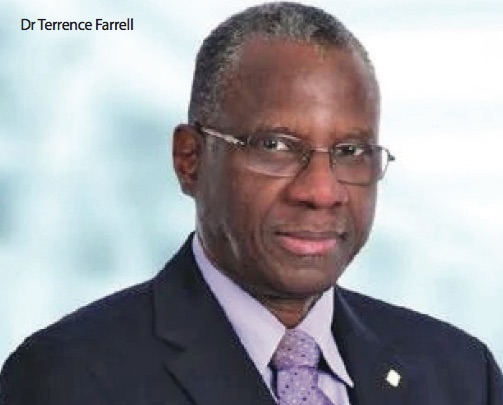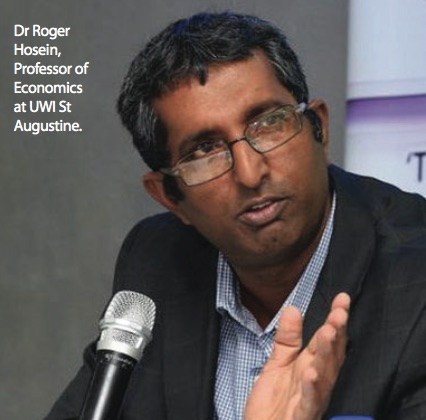
Trinidad and Tobago’s foreign exchange situation is not dire. This was the statement of Dr Terrence Farrell, former Deputy Governor of the Central Bank of Trinidad and Tobago, during his keynote address at the Trade and Economic Development Unit’s recent “FOREX Flows and Woes” virtual seminar.
Dr Farrell noted, “We have the official reserves which are currently about 6.3 billion [dollars], but have come down significantly over the course of the last eight years or so. We have the HSF [the Heritage and Stabilisation Fund] which is about five and a half billion currently.”
He added, “We have some amount of foreign currency deposits which, in an extreme situation, the government could potentially access. The point I am making here is that the foreign exchange situation is not dire.”

Why then does the average citizen struggle to get foreign exchange? The answer lies with the way the funds are distributed. The Central Bank of Trinidad and Tobago provides the banks with foreign exchange. Dr Farrell explained that this leaves them with the difficult role of rationing the funds to customers.
“The commercial banks manage their foreign exchange situation by ensuring that on a day-to-day, week-to-week basis they don't sell more foreign exchange than they have,” he said. The situation is worse when citizens need the US dollars in cash which are extremely scarce.
Dr Farrell explained that the reason for this overall scarcity comes down to gas.
“The foreign exchange essentially comes from the energy sector,” he said. “It comes from the upstream producers.”
He continued, “The gas comes in. The natural gas goes out. They provide the tax revenues in US dollars to the government, to the Central Bank.”
However, Trinidad and Tobago’s natural gas and crude oil production have been falling: “We have come down from being a 4 bcf [billion cubic feet] per day economy to an economy where we are now about 2.7 bcf per day.”
The former deputy governor noted that it is impossible right now to predict the future of natural gas and oil prices. “The best estimate of price tomorrow is the price today.”
He said that the reserves would continue to decline slowly though the situation is not dire. However, he commented, “The current infrastructure that we have in respect to the foreign exchange market and the exchange rate” are a disincentive to economic diversification and the production of tradable goods outside of the energy sector.
As he summed up Dr Farrell’s address, session chair Mr Vivek Charran, Chairman of The Confederation of Regional Business Chambers, observed, “ Whereas we're not at that crisis level as yet, some aspects within our economy, particularly certain sectors, are feeling the pinch very much while others are not.”
During his contribution to the seminar, trade unionist Mr Michael Annisette stressed that the unions saw the economy in the context of people.
“Are we looking at the amount of small business, medium-sized business that are shutting their doors every day?” he asked. “What are the implications for the economy? What are the implications for the whole social society?”
He added, “What happens to a worker in the context of this foreign exchange?” Because of inflation, he notes, the value of the dollar makes it difficult for ordinary citizens to purchase the goods and services they normally buy.
Economist Dr Rebecca Gookool-Bosland also noted the economy is “19.8 percent smaller than in 2015 and 8.8 percent smaller than in 2019. This declining growth trajectory and the magnitude of this declining growth is, of course, coinciding with the declining quality of our macroeconomic environment.”
She noted that under-employment is rising while the labour force participation rate is falling. She pointed out that the ease of doing business is worsening and there are fewer employment opportunities. She also highlighted the issues of weakened economic linkages between sectors, youth unemployment, crime, and reduced citizen security.
“The average man on the street is feeling the decline,” she declared. “It is showing up in lesser sales for him. The average doubles man is now selling less. He now has to come out more often. He is now faced with the threat of someone coming to rob him on the spot. And the narrative that is being touted is that things are getting better. The truth is these numbers show otherwise.”
“We are living in Trinidad and Tobago, and as workers, we have a right to be able to maintain a standard of living that would not send us into abject poverty,” asserted Annisette. “How do we then move forward if we want to be solution oriented?”
He suggested the education system, connecting the state of education to the crime situation.
Dr Roger Hosein, Professor of Economics at UWI St Augustine, recommended taking urgent steps to switch to green hydrogen, an alternative form of energy. He also emphasised the vital role tourism could play in boosting foreign exchange.

Dr Gookool-Bosland suggested that entrepreneurs should focus less on buy and sell operations, and more on crafts and skills such as carpentry, plumbing, and tiling. She underscored the importance of Spanish language proficiency.
She added, “At the community level, there is a need for smaller, medium-sized, and other types of firms to get involved in their CSR [corporate social responsibility] interventions to focus on smaller micro suppliers. Business chambers can and should be used as hubs for incubators focusing on a hub-based set of services that micro businesses may need.”
"FOREX Flows and Woes” was part of UWI St Augustine’s influential National Conversations Series. The Trade and Economic Development Unit (TEDU) is a research cluster within the Department of Economics in the Faculty of Social Sciences.